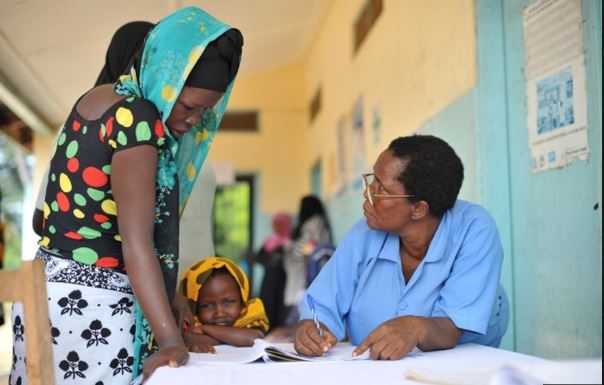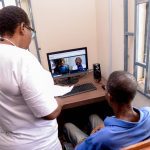The United States launched a new, five-year USD $40 million Health Financing Improvement Program to invest in expanding Ethiopia’s capacity to provide quality affordable healthcare to citizens across the country.
Under the new program, the U.S. Agency for International Development (USAID) will work with the Ministry of Health to strengthen policy and financing reforms that enable public and private entities to better provide primary health services while reducing out-of-pocket expenses for Ethiopians.
USAID’s Health Financing Improvement Program builds upon the successes of earlier investments like USAID’s community-based health insurance initiative, which currently provides medical coverage to nearly 20 million Ethiopians nationwide.
Over the next five years, the new program will focus on mobilizing increased domestic resources and streamlining medical insurance schemes to expand coverage to millions more people. The project will also work with public and private healthcare providers to better utilize resources and revenues to finance their services.
There are many barriers to residents obtaining proper health care in Ethiopia. It is estimated that 76 percent of Ethiopian women live in rural areas and do not have access to health care due to long traveling distances with lack of transportation.
There is a great need for proper health care in Ethiopia when disease is responsible for 74 percent of deaths.
USAID Mission Director Leslie Reed remarked, “We look forward to continuing our joint work to tackle the challenges facing health financing as part of overall efforts to build a truly sustainable and resilient health system in Ethiopia. Together, we can show other developing countries around the world that with the right political will and commitment, it is possible to lay the promising foundation to a self-reliant healthcare system, capable of providing high-quality health services to all citizens in every corner of the country.”
U.S. development programs like the Health Financing Improvement program invest in the capacity of Ethiopian institutions and the Ethiopian people to address their own needs and become stronger partners. The United States is the largest bilateral donor to Ethiopia’s health sector, with approximately USD $150 million per year in funding for HIV/AIDS; malaria; maternal, neonatal and child health; nutrition; tuberculosis; and water, sanitation and hygiene. Overall, the United States has provided over $4 billion in development and humanitarian assistance to Ethiopia over the past five years.
The United States launched a new, five-year USD $40 million Health Financing Improvement Program to invest in expanding Ethiopia’s capacity to provide quality affordable healthcare to citizens across the country.
Under the new program, the U.S. Agency for International Development (USAID) will work with the Ministry of Health to strengthen policy and financing reforms that enable public and private entities to better provide primary health services while reducing out-of-pocket expenses for Ethiopians.
USAID’s Health Financing Improvement Program builds upon the successes of earlier investments like USAID’s community-based health insurance initiative, which currently provides medical coverage to nearly 20 million Ethiopians nationwide.
Over the next five years, the new program will focus on mobilizing increased domestic resources and streamlining medical insurance schemes to expand coverage to millions more people. The project will also work with public and private healthcare providers to better utilize resources and revenues to finance their services.
There are many barriers to residents obtaining proper health care in Ethiopia. It is estimated that 76 percent of Ethiopian women live in rural areas and do not have access to health care due to long traveling distances with lack of transportation.
There is a great need for proper health care in Ethiopia when disease is responsible for 74 percent of deaths.
USAID Mission Director Leslie Reed remarked, “We look forward to continuing our joint work to tackle the challenges facing health financing as part of overall efforts to build a truly sustainable and resilient health system in Ethiopia. Together, we can show other developing countries around the world that with the right political will and commitment, it is possible to lay the promising foundation to a self-reliant healthcare system, capable of providing high-quality health services to all citizens in every corner of the country.”
U.S. development programs like the Health Financing Improvement program invest in the capacity of Ethiopian institutions and the Ethiopian people to address their own needs and become stronger partners. The United States is the largest bilateral donor to Ethiopia’s health sector, with approximately USD $150 million per year in funding for HIV/AIDS; malaria; maternal, neonatal and child health; nutrition; tuberculosis; and water, sanitation and hygiene. Overall, the United States has provided over $4 billion in development and humanitarian assistance to Ethiopia over the past five years.
The United States launched a new, five-year USD $40 million Health Financing Improvement Program to invest in expanding Ethiopia’s capacity to provide quality affordable healthcare to citizens across the country.
Under the new program, the U.S. Agency for International Development (USAID) will work with the Ministry of Health to strengthen policy and financing reforms that enable public and private entities to better provide primary health services while reducing out-of-pocket expenses for Ethiopians.
USAID’s Health Financing Improvement Program builds upon the successes of earlier investments like USAID’s community-based health insurance initiative, which currently provides medical coverage to nearly 20 million Ethiopians nationwide.
Over the next five years, the new program will focus on mobilizing increased domestic resources and streamlining medical insurance schemes to expand coverage to millions more people. The project will also work with public and private healthcare providers to better utilize resources and revenues to finance their services.
There are many barriers to residents obtaining proper health care in Ethiopia. It is estimated that 76 percent of Ethiopian women live in rural areas and do not have access to health care due to long traveling distances with lack of transportation.
There is a great need for proper health care in Ethiopia when disease is responsible for 74 percent of deaths.
USAID Mission Director Leslie Reed remarked, “We look forward to continuing our joint work to tackle the challenges facing health financing as part of overall efforts to build a truly sustainable and resilient health system in Ethiopia. Together, we can show other developing countries around the world that with the right political will and commitment, it is possible to lay the promising foundation to a self-reliant healthcare system, capable of providing high-quality health services to all citizens in every corner of the country.”
U.S. development programs like the Health Financing Improvement program invest in the capacity of Ethiopian institutions and the Ethiopian people to address their own needs and become stronger partners. The United States is the largest bilateral donor to Ethiopia’s health sector, with approximately USD $150 million per year in funding for HIV/AIDS; malaria; maternal, neonatal and child health; nutrition; tuberculosis; and water, sanitation and hygiene. Overall, the United States has provided over $4 billion in development and humanitarian assistance to Ethiopia over the past five years.
The United States launched a new, five-year USD $40 million Health Financing Improvement Program to invest in expanding Ethiopia’s capacity to provide quality affordable healthcare to citizens across the country.
Under the new program, the U.S. Agency for International Development (USAID) will work with the Ministry of Health to strengthen policy and financing reforms that enable public and private entities to better provide primary health services while reducing out-of-pocket expenses for Ethiopians.
USAID’s Health Financing Improvement Program builds upon the successes of earlier investments like USAID’s community-based health insurance initiative, which currently provides medical coverage to nearly 20 million Ethiopians nationwide.
Over the next five years, the new program will focus on mobilizing increased domestic resources and streamlining medical insurance schemes to expand coverage to millions more people. The project will also work with public and private healthcare providers to better utilize resources and revenues to finance their services.
There are many barriers to residents obtaining proper health care in Ethiopia. It is estimated that 76 percent of Ethiopian women live in rural areas and do not have access to health care due to long traveling distances with lack of transportation.
There is a great need for proper health care in Ethiopia when disease is responsible for 74 percent of deaths.
USAID Mission Director Leslie Reed remarked, “We look forward to continuing our joint work to tackle the challenges facing health financing as part of overall efforts to build a truly sustainable and resilient health system in Ethiopia. Together, we can show other developing countries around the world that with the right political will and commitment, it is possible to lay the promising foundation to a self-reliant healthcare system, capable of providing high-quality health services to all citizens in every corner of the country.”
U.S. development programs like the Health Financing Improvement program invest in the capacity of Ethiopian institutions and the Ethiopian people to address their own needs and become stronger partners. The United States is the largest bilateral donor to Ethiopia’s health sector, with approximately USD $150 million per year in funding for HIV/AIDS; malaria; maternal, neonatal and child health; nutrition; tuberculosis; and water, sanitation and hygiene. Overall, the United States has provided over $4 billion in development and humanitarian assistance to Ethiopia over the past five years.
The United States launched a new, five-year USD $40 million Health Financing Improvement Program to invest in expanding Ethiopia’s capacity to provide quality affordable healthcare to citizens across the country.
Under the new program, the U.S. Agency for International Development (USAID) will work with the Ministry of Health to strengthen policy and financing reforms that enable public and private entities to better provide primary health services while reducing out-of-pocket expenses for Ethiopians.
USAID’s Health Financing Improvement Program builds upon the successes of earlier investments like USAID’s community-based health insurance initiative, which currently provides medical coverage to nearly 20 million Ethiopians nationwide.
Over the next five years, the new program will focus on mobilizing increased domestic resources and streamlining medical insurance schemes to expand coverage to millions more people. The project will also work with public and private healthcare providers to better utilize resources and revenues to finance their services.
There are many barriers to residents obtaining proper health care in Ethiopia. It is estimated that 76 percent of Ethiopian women live in rural areas and do not have access to health care due to long traveling distances with lack of transportation.
There is a great need for proper health care in Ethiopia when disease is responsible for 74 percent of deaths.
USAID Mission Director Leslie Reed remarked, “We look forward to continuing our joint work to tackle the challenges facing health financing as part of overall efforts to build a truly sustainable and resilient health system in Ethiopia. Together, we can show other developing countries around the world that with the right political will and commitment, it is possible to lay the promising foundation to a self-reliant healthcare system, capable of providing high-quality health services to all citizens in every corner of the country.”
U.S. development programs like the Health Financing Improvement program invest in the capacity of Ethiopian institutions and the Ethiopian people to address their own needs and become stronger partners. The United States is the largest bilateral donor to Ethiopia’s health sector, with approximately USD $150 million per year in funding for HIV/AIDS; malaria; maternal, neonatal and child health; nutrition; tuberculosis; and water, sanitation and hygiene. Overall, the United States has provided over $4 billion in development and humanitarian assistance to Ethiopia over the past five years.
The United States launched a new, five-year USD $40 million Health Financing Improvement Program to invest in expanding Ethiopia’s capacity to provide quality affordable healthcare to citizens across the country.
Under the new program, the U.S. Agency for International Development (USAID) will work with the Ministry of Health to strengthen policy and financing reforms that enable public and private entities to better provide primary health services while reducing out-of-pocket expenses for Ethiopians.
USAID’s Health Financing Improvement Program builds upon the successes of earlier investments like USAID’s community-based health insurance initiative, which currently provides medical coverage to nearly 20 million Ethiopians nationwide.
Over the next five years, the new program will focus on mobilizing increased domestic resources and streamlining medical insurance schemes to expand coverage to millions more people. The project will also work with public and private healthcare providers to better utilize resources and revenues to finance their services.
There are many barriers to residents obtaining proper health care in Ethiopia. It is estimated that 76 percent of Ethiopian women live in rural areas and do not have access to health care due to long traveling distances with lack of transportation.
There is a great need for proper health care in Ethiopia when disease is responsible for 74 percent of deaths.
USAID Mission Director Leslie Reed remarked, “We look forward to continuing our joint work to tackle the challenges facing health financing as part of overall efforts to build a truly sustainable and resilient health system in Ethiopia. Together, we can show other developing countries around the world that with the right political will and commitment, it is possible to lay the promising foundation to a self-reliant healthcare system, capable of providing high-quality health services to all citizens in every corner of the country.”
U.S. development programs like the Health Financing Improvement program invest in the capacity of Ethiopian institutions and the Ethiopian people to address their own needs and become stronger partners. The United States is the largest bilateral donor to Ethiopia’s health sector, with approximately USD $150 million per year in funding for HIV/AIDS; malaria; maternal, neonatal and child health; nutrition; tuberculosis; and water, sanitation and hygiene. Overall, the United States has provided over $4 billion in development and humanitarian assistance to Ethiopia over the past five years.
The United States launched a new, five-year USD $40 million Health Financing Improvement Program to invest in expanding Ethiopia’s capacity to provide quality affordable healthcare to citizens across the country.
Under the new program, the U.S. Agency for International Development (USAID) will work with the Ministry of Health to strengthen policy and financing reforms that enable public and private entities to better provide primary health services while reducing out-of-pocket expenses for Ethiopians.
USAID’s Health Financing Improvement Program builds upon the successes of earlier investments like USAID’s community-based health insurance initiative, which currently provides medical coverage to nearly 20 million Ethiopians nationwide.
Over the next five years, the new program will focus on mobilizing increased domestic resources and streamlining medical insurance schemes to expand coverage to millions more people. The project will also work with public and private healthcare providers to better utilize resources and revenues to finance their services.
There are many barriers to residents obtaining proper health care in Ethiopia. It is estimated that 76 percent of Ethiopian women live in rural areas and do not have access to health care due to long traveling distances with lack of transportation.
There is a great need for proper health care in Ethiopia when disease is responsible for 74 percent of deaths.
USAID Mission Director Leslie Reed remarked, “We look forward to continuing our joint work to tackle the challenges facing health financing as part of overall efforts to build a truly sustainable and resilient health system in Ethiopia. Together, we can show other developing countries around the world that with the right political will and commitment, it is possible to lay the promising foundation to a self-reliant healthcare system, capable of providing high-quality health services to all citizens in every corner of the country.”
U.S. development programs like the Health Financing Improvement program invest in the capacity of Ethiopian institutions and the Ethiopian people to address their own needs and become stronger partners. The United States is the largest bilateral donor to Ethiopia’s health sector, with approximately USD $150 million per year in funding for HIV/AIDS; malaria; maternal, neonatal and child health; nutrition; tuberculosis; and water, sanitation and hygiene. Overall, the United States has provided over $4 billion in development and humanitarian assistance to Ethiopia over the past five years.
The United States launched a new, five-year USD $40 million Health Financing Improvement Program to invest in expanding Ethiopia’s capacity to provide quality affordable healthcare to citizens across the country.
Under the new program, the U.S. Agency for International Development (USAID) will work with the Ministry of Health to strengthen policy and financing reforms that enable public and private entities to better provide primary health services while reducing out-of-pocket expenses for Ethiopians.
USAID’s Health Financing Improvement Program builds upon the successes of earlier investments like USAID’s community-based health insurance initiative, which currently provides medical coverage to nearly 20 million Ethiopians nationwide.
Over the next five years, the new program will focus on mobilizing increased domestic resources and streamlining medical insurance schemes to expand coverage to millions more people. The project will also work with public and private healthcare providers to better utilize resources and revenues to finance their services.
There are many barriers to residents obtaining proper health care in Ethiopia. It is estimated that 76 percent of Ethiopian women live in rural areas and do not have access to health care due to long traveling distances with lack of transportation.
There is a great need for proper health care in Ethiopia when disease is responsible for 74 percent of deaths.
USAID Mission Director Leslie Reed remarked, “We look forward to continuing our joint work to tackle the challenges facing health financing as part of overall efforts to build a truly sustainable and resilient health system in Ethiopia. Together, we can show other developing countries around the world that with the right political will and commitment, it is possible to lay the promising foundation to a self-reliant healthcare system, capable of providing high-quality health services to all citizens in every corner of the country.”
U.S. development programs like the Health Financing Improvement program invest in the capacity of Ethiopian institutions and the Ethiopian people to address their own needs and become stronger partners. The United States is the largest bilateral donor to Ethiopia’s health sector, with approximately USD $150 million per year in funding for HIV/AIDS; malaria; maternal, neonatal and child health; nutrition; tuberculosis; and water, sanitation and hygiene. Overall, the United States has provided over $4 billion in development and humanitarian assistance to Ethiopia over the past five years.














